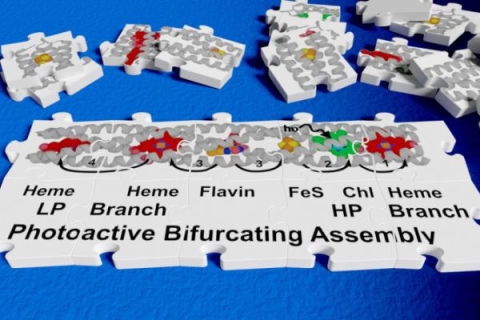

The work promises new ‘green’ catalysts, and biomolecular components for future technologies in biological electronics and engineering biology
28 January 2022
4 min read
Researchers from universities across the UK, including the University of Portsmouth, have been awarded £4.9 million to investigate how electrons and energy flow through biological molecules by building artificial protein-based wires and circuits.
The funding comes from the Biotechnology and Biological Sciences Research Council (BBSRC), the UK’s largest bioscience funder.
The work promises new ‘green’ catalysts, and biomolecular components for future technologies in biological electronics and engineering biology.
The five-year award, part of the BBSRC’s Strategic Longer and Larger (sLoLa) scheme, brings together an interdisciplinary team of academics from the Universities of Bristol, Portsmouth, East Anglia and University College London, with complementary expertise in protein design, electron transfer, biomolecular simulation, synthetic chemistry and ultrafast spectroscopy.
This project will be delivered in part in the CEI Industrial Engagement Hub, enabled by the £1million investment by the HM Government "Getting Building" Fund through the Solent LEP
I believe this [work] will have a profound impact on our ability to create biological devices that can better detect disease, more efficiently capture light energy, and allow the creation of new enzymes that can be used in everything from making medicines to breaking down complex polymers.
Dr Bruce Lichtenstein, Centre for Enzyme Innovation
The project builds on the work of Dr Bruce Lichtenstein from the University of Portsmouth’s Centre for Enzyme Innovation (while he was at the University of Pennsylvania), who was the first to assemble protein-based circuits with chosen electron transfer characteristics. This flow of electrons and energy through protein-based circuits underpins all life on earth.
Dr Lichtenstein said: “Although life cannot exist without respiration and photosynthesis, we cannot yet precisely engineer proteins to direct energy and electrons in the same way our cells or plants can. This work and the assembled team hold substantial promise to change the way we understand and approach building protein circuits. I believe this will have a profound impact on our ability to create biological devices that can better detect disease, more efficiently capture light energy, and allow the creation of new enzymes that can be used in everything from making medicines to breaking down complex polymers.”
Project lead Ross Anderson, Associate Professor in Biological Chemistry at the University of Bristol, said: “I’m exceptionally excited to be working with this fantastic team on our ‘Circuits of Life’ project. We aim to release the incredible and largely untapped potential of the natural electron- and energy-conducting circuitry.”
Both Dr Anderson and Dr Lichtenstein have designed ‘unnatural’ proteins (proteins that don’t exist in nature) with the ability to transfer electrons and to carry out important chemical transformations.
In the new project, these proteins will be used as building blocks that promise to be components of new biologically-based devices.
The collaborations are complementary to our strengths in protein engineering and will take advantage of our new polymer synthesis laboratory space. The work also helps to raise the profile of innovative research at the University of Portsmouth, highlighting the CEI's growing capabilities in molecular bioscience research.
Dr Bruce Lichtenstein, Centre for Enzyme Innovation
The team will combine their expertise to design new proteins able to assemble into biological wires. Collaborating through virtual reality, and using computational tools, including advanced molecular analysis, the team will design protein modules with new properties. In the laboratory, these will be assembled into circuits with the ability to capture light or to funnel electrons to drive biochemical reactions. The researchers will use state of the art spectroscopy techniques to reveal the flow of energy and electrons through the designed proteins.
Through iterative rounds of designing, building and testing, the team hopes to gain a better understanding on how these energy transfer systems work in nature, and how to engineer them.
With this new understanding, the team predicts that these biocompatible electrical and light-activated circuits will form the foundation for new tailor-made catalysts for green industrial biotechnology, and tuneable protein-based solar panels. Integrating these artificial biological circuits into cells may also provide new routes to biosensors, useful for diagnosis and treatment of a range of diseases.
In addition to Dr Anderson, the academics involved in the project are Professor Adrian Mulholland, Dr Tom Oliver, Dr Paul Curnow, Dr Fabio Parmeggiani and Dr Sofia Oliveira from the University of Bristol. They are joined by Dr Bruce Lichtenstein from the University of Portsmouth, Professor Julea Butt from the University of East Anglia and Dr Amandine Marechal from University College London.
Dr Lichtenstein added: “This partnership is a great opportunity for the CEI to establish new and deepen pre-existing collaborations with scientists working at the cutting-edge of the physical sciences. The collaborations are complementary to our strengths in protein engineering and will take advantage of our new polymer synthesis laboratory space. The work also helps to raise the profile of innovative research at the University of Portsmouth, highlighting the CEI's growing capabilities in molecular bioscience research.”
